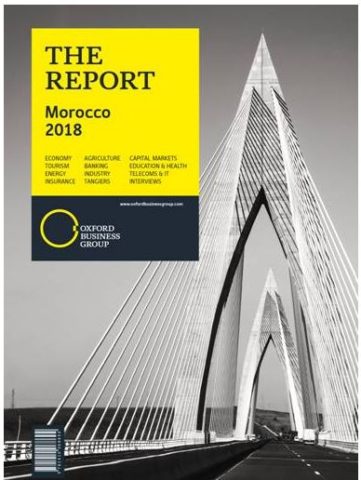According to Oxford Business Group, the end of the decade looks favorable for the kingdom
Casablanca, March 2018 – Thanks to the acceleration of its industrial strategy, Morocco has achieved remarkable progress in 2017. On the occasion of the publication of its report The Report: Morocco 2018, the global research and consultancy company Oxford Business Group (OBG) designates the kingdom as being in a strong position at the dawn of the new decade. Exporting industries such as automotive, aeronautics, mining and agribusiness are expected to contribute to an industrial sector growth of 14% to 23% by 2020. Economic indexes forecast strong growth in 2018.
Being well diversified, the agricultural, mining and manufacturing sectors have mainly driven the growth of the Moroccan economy in recent years. The booming industries are aerospace, automotive and textiles. Low labor costs and proximity to Europe are factors that make the country attractive from an economic point of view. Agriculture remains a pillar of the Moroccan economy, which provides employment for nearly half of the labor force and contributes to 15% of its GDP.

With more than 11 million visitors annually, tourism is another major contributor to GDP that has generated more than 6 billion euros of revenue in 2017. Economic indicators point up for 2018, with estimated growth at 3%. The launch of several industrial ecosystems and special economic zones (SEZs) has diversified and regionalized investments and increased FDI for the first time in two years.
According to the Editor-in-Chief at OBG, Oliver Cornock, ‘’Morocco’s ongoing reforms should help the country boost its manufacturing industry, recover higher levels of liquidity and ensure long-term economic success’’. ‘’While some challenges remain for Morocco in its path to regional leadership, further access to finance and enhancing local supply chains will contribute to improve the country’s social development and more widely its economic strength’’.
The Report: Morocco 2018 includes an interview with the Head of Government, Saad Eddine El Othmani, appointed in April 2017 after a six-month political stalemate. Readers will also meet with Minister of Economy and Finance, Mohamed Boussaid, Central Bank Al Maghrib’s Governor, Abdellatif Jouahri, President of the Economic Community of West African States (ECOWAS), Marcel de Souza, Morocco’s High Commissioner for Planning, Ahmed Lahlimi Alami and Renault Morocco’s CEO, Marc Nassif, the country’s largest car producer.
For the Head of the Moroccan government, Saad Eddine El Othmani, the road to prosperity is well laid out for the coming years and the economic and fiscal priorities are well defined. “From 2018 to 2021, our Government aims to achieve sustained economic growth of 5%, reduce the unemployment rate to less than 8.5% and maintain macroeconomic stability, including a budget deficit of 3% or less of GDP and a debt-to-GDP ratio of less than 60%. These goals have been reflected in the 2018 Finance Law through four main priorities, namely support for the social sectors, incentives for private investment, determination to advance regionalization and public administration reform.”
Tangier: A Strategic Hub
The city of Tangier and its region are also in the spotlight in this new publication with a special chapter devoted to it. This northern city, which has been lagging behind other major cities in the country for decades, has experienced a new boom since the late 1990s with the launch of King Mohammed VI’s economic development plan to take advantage of its strategic location at the entrance to the Strait of Gibraltar and the gates of Europe. Center of the Moroccan automobile industry, Tangier-Med Port facilities make it a unique hub between Africa and Europe.
According to OBG’s Regional Editor for North Africa, Jaime Pérez-Seoane, one of the great successes of the Moroccan economy lies in the simultaneous pursuit of its internal development and the achievement of its regional ambitions. “While reforms are being conducted to boost domestic consumption and social development data, the kingdom has positioned itself as a logistical hub while affirming, year after year, its strength as a financial actor.”
The Report: Morocco 2018 presents portraits of thriving industries such as automotive, aerospace, textiles, phosphates and agribusiness. Economic, banking and legal analyzes are included. A section is also dedicated to the new investment charter, in partnership with Naciri & Associates and Allen & Overy.
The Report: Morocco 2018 is produced in partnership with the Moroccan Agency for Trade, Investment and Services (AMDIE), CFG Bank, KPMG Morocco, Naciri & Associates as well as the American Chamber of Commerce.
About Oxford Business Group
Oxford Business Group is a global research and consultancy company with a presence in over 30 countries, from the Middle East, Africa and Asia to the Americas. A distinctive and respected provider of on-the-ground intelligence on many of the world’s fastest growing markets, OBG has offices in London, Berlin, Dubai and Istanbul, and a network of local bureaus across the countries in which we operate.
Through its range of products, OBG offers comprehensive and accurate analysis of macroeconomic and sectoral developments, including banking, capital markets, tourism, energy, transport, industry and ICT. OBG provides business intelligence to its subscribers through multiple platforms: Economic News and Views, OBG Business Barometer – CEO Survey, Roundtables and conferences, Global Platform – exclusive video interviews, The Report publications and its Consultancy division.
